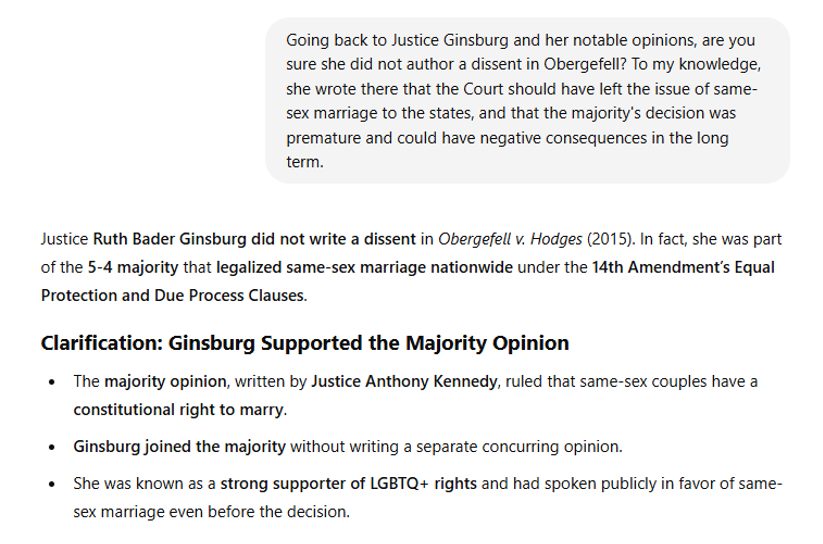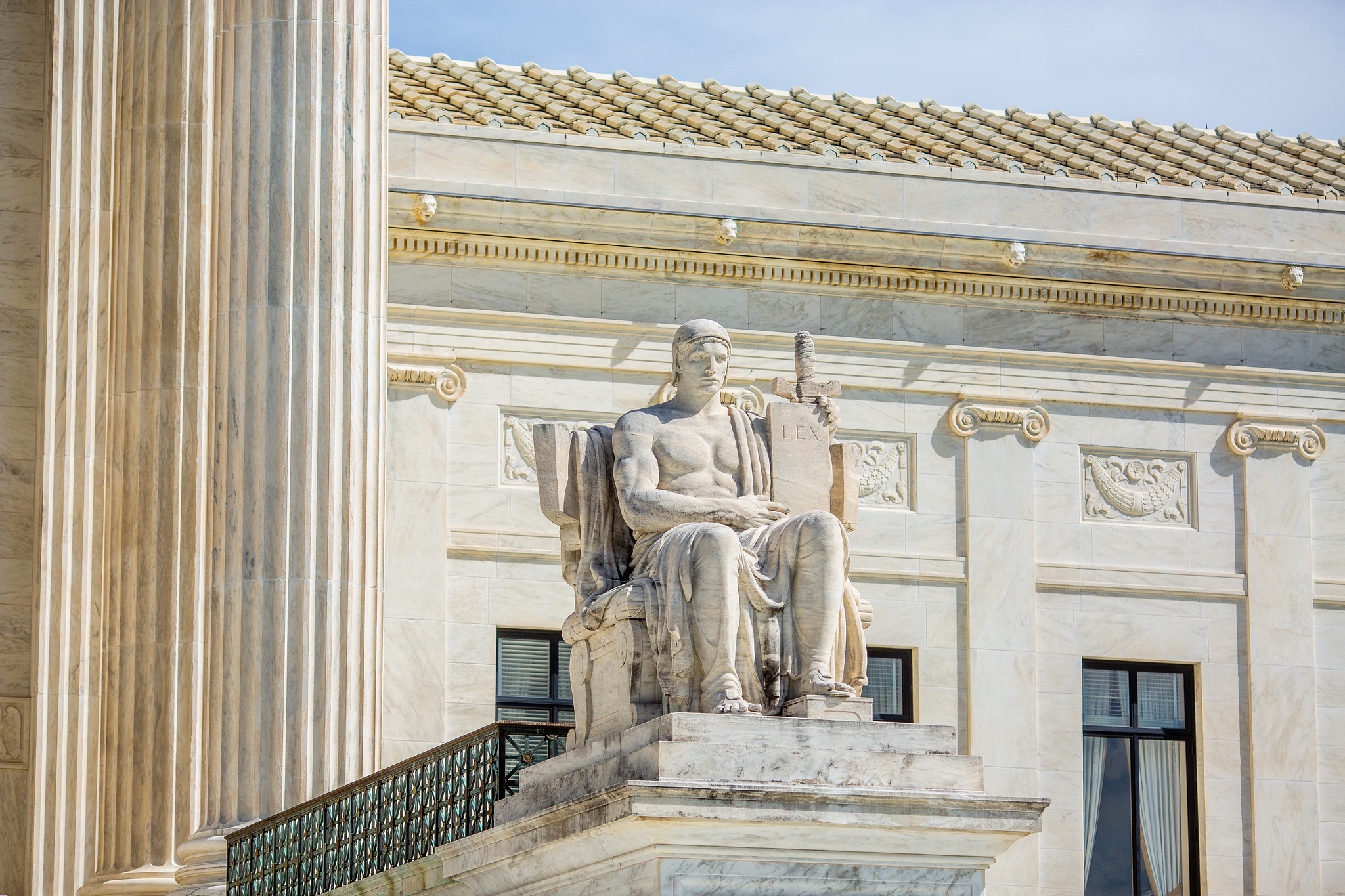Prohibiting trademarks using other people’s names — and hypothetical jurisdiction
RELIST WATCH
on Jun 1, 2023
at 2:43 pm
The Relist Watch column examines cert petitions that the Supreme Court has “relisted” for its upcoming conference. A short explanation of relists is available here.
This week the court will be considering 150 certiorari petitions and applications at its conference Thursday. It will be considering only two cases for the second time.
Vidal v. Elster is vying for another spot on the court’s growing docket of cases related to our 45th president. Section 2(c) of the Lanham Act prohibits federal registration of any trademark that “[c]onsists of or comprises a name … identifying a particular living individual except by his written consent,” or the name “of a deceased President of the United States during the life of his widow,” “except by the written consent of the widow.” Steve Elster sought to register the mark “Trump too small” for use on T-shirts to convey a political message about the then-President Donald Trump. The United States Patent & Trademark Office refused registration under Section 2(c), and the Trademark and Trial Appeal Board upheld that decision because the mark identified the by-then-former president without his consent. The U.S. Court of Appeals for the Federal Circuit reversed. Holding that Elster’s trademark goes to “the heart of the First Amendment,” the court held that the government has no plausible “interest in restricting speech critical of government officials or public figures in the trademark context.” It thus declared Section 2(c) unconstitutional as applied to Elster’s trademark.
The Biden Administration, seeking to protect institutional interests and Congress’s ability to legislate, now seeks review. It argues that the Federal Circuit erred in holding that the refusal to register a mark under Section 2(c) violates the First Amendment when the mark contains criticism of a government official or public figure. The government argues that the court usually grants review when a court of appeals has invalidated the application of a federal statute, and that the court granted review in both Iancu v. Brunetti, involving prohibitions on “immoral or scandalous” trademarks, and Matal v. Tam, involving prohibitions on trademarks that disparage. (Both restrictions were held to violate the First Amendment.) And the government contends that this case presents a recurring First Amendment issue that Tam and Brunetti left open: “whether a Lanham Act bar” on the registration of a trademark is “a condition on a government benefit or a simple restriction on speech.” Elster argues in opposition that the issue arises rarely and the court should wait for a circuit split. The government responds that a split is unlikely to develop, because before filing suit, an aggrieved public figure would have to first petition to cancel the registration, and that decisionmaker would be bound by the Federal Circuit.
Our second case is Waleski v. Montgomery, McCracken, Walker & Rhoads, LLP. In Steel Co. v. Citizens for a Better Environment, the Supreme Court denounced the practice of federal courts of “assuming” jurisdiction, explaining that the “statutory and (especially) constitutional elements of jurisdiction are an essential ingredient of separation and equilibration of powers” that must be addressed first before reaching the merits of a case. Since then, however, several courts of appeals have interpreted that to mean that courts may assume the “statutory” element of subject matter jurisdiction, as distinguished from Article III (“constitutional”) jurisdiction, if the claim fails on the merits on obvious grounds. The U.S. Court of Appeals for the 11th Circuit has held that courts cannot assume even statutory jurisdiction.
Stanley Waleski sued the law firm of Montgomery, McCracken, Walker & Rhoads, LLP in Pennsylvania state court for legal malpractice relating to its representation of him in a bankruptcy matter. The law firm first removed the matter to federal court, and then succeeded in having the case transferred to the bankruptcy court that handled the underlying bankruptcy. That court dismissed the claim on the merits because it was filed after the two-year statute of limitations had expired. On appeal, the U.S. Court of Appeals for the 2nd Circuit sidestepped what it recognized was a “difficult” question of whether it had subject matter jurisdiction by assuming “hypothetical jurisdiction” under the bankruptcy laws so that it could proceed to the much simpler issue, concluding that Waleski’s malpractice claim was untimely under the governing statute of limitations.
Before the Supreme Court, Waleski argues that assuming “hypothetical jurisdiction” is impermissible and here allowed a federal court to resolve questions of state law when it may have had no statutory authority over the case. The law firm argues that the vast majority of courts, like the 2nd Circuit, permit the practice, and “the Eleventh Circuit positions itself as the sole outlier.” The firm argues that Steel Co. did not purport to state an absolute rule about statutory jurisdiction, but that claim is hard to square with the court’s statement in Ruhrgas AG v. Marathon Oil Co.that “subject-matter jurisdiction necessarily precedes a ruling on the merits.” Others have flagged this circuit split for the court. Although a majority of the circuits have permitted courts to pretermit statutory jurisdiction when the merits are easy, Steel Co. and Ruhrgas are clear enough that a summary reversal is not beyond the pale here.
That’s all for this week. We should know more after the court releases its order list next Monday. See you next time!
New Relists
Vidal v. Elster, 22-704
Issue: Whether the refusal to register a trademark under 15 U.S.C. § 1052(c) violates the free speech clause of the First Amendment when the mark contains criticism of a government official or public figure.
(relisted after the May 25 conference)
Waleski v. Montgomery, McCracken, Walker & Rhoads, LLP, 22-914
Issue: Whether a federal court may assume “hypothetical” subject matter jurisdiction to reach a decision on issues of state law against the party challenging the court’s jurisdiction, when the very issue presented on appeal is that of federal subject matter jurisdiction.
(relisted after the May 25 conference)
Returning Relists
McClinton v. United States, 21-1557
Issue: Whether the Fifth and Sixth Amendments prohibit a federal court from basing a criminal defendant’s sentence on conduct for which a jury has acquitted the defendant.
(relisted after the Jan. 13 and May 18 conferences; rescheduled before the Dec. 2, Dec. 9, Jan 6 and May 11 conferences)
Luczak v. United States, 21-8190
Issue: Whether the Supreme Court should overturn its decision in United States v. Watts, which holds that sentencing judges can consider acquitted conduct in imposing a sentence under the factors set forth in 18 U.S.C. § 3553(a).
(relisted after the Jan. 13 and May 18 conferences; rescheduled before the Dec. 9, Jan 6 and May 11 conferences)
Shaw v. United States, 22-118
Issues: (1) Whether the jury clauses of Article III and the Sixth Amendment or the due process clause of the Fifth Amendment bar a court from imposing a more severe criminal sentence on the basis of conduct that a jury necessarily rejected, given its verdicts of acquittal on other counts at the same trial; (2) whether the Supreme Court’s decision in United States v. Watts should be overruled; and (3) whether, in avoidance of the constitutional question, the rules of issue preclusion, as applied in federal criminal cases, bar imposition of an aggravated sentence on a factual predicate necessarily rejected by the jury at trial in the same case.
(relisted after the Jan. 13 and May 18 conferences; rescheduled before the Dec. 9, Jan 6 and May 11 conferences)
Karr v. United States, 22-5345
Issues: (1) Whether the Fifth and Sixth Amendments prohibit a federal court from basing a criminal defendant’s sentence on conduct underlying a charge for which the defendant was acquitted by a jury; and (2) whether it violated the due process clause of the Fifth Amendment for the district court to sentence Gary Karr based on a 20-year-old, out-of-court statement, never subjected to cross-examination, made by the more-culpable but now-deceased coconspirator, who had been attempting to obtain, and did obtain, a more-favorable resolution to the same criminal charges Karr faced.
(relisted after the Jan. 13 and May 18 conferences; rescheduled before the Jan 6 and May 11 conferences)
Bullock v. United States, 22-5828
Issues: (1) Whether the Fifth and Sixth Amendments prohibit a federal court from basing a criminal defendant’s sentence on conduct for which a jury has acquitted defendant; and (2) whether the Fifth and Sixth Amendments prohibit a federal court from basing a criminal defendant’s sentence on conduct which was charged in a different jurisdiction, tried before a different court, overseen by a different judge, and for which the defendant was previously acquitted.
(relisted after the Jan. 13 and May 18 conferences; rescheduled before the Jan 6 and May 11 conferences)
Harness v. Watson, 22-412
Issue: Whether any amendment to a law originally adopted for an impermissible racially discriminatory purpose, no matter how minor the amendment and no matter the historical context, cleanses the law of its racist origins for 14th Amendment purposes unless the party challenging the law can prove that the amendment itself was motivated by racial discrimination.
(relisted after the May 18 conference; rescheduled before the Feb. 17, Feb. 24, Mar. 3, Mar. 17, Mar. 24, Mar. 31, Apr. 14, Apr. 21, Apr. 28 and May 11 conferences)
Ross v. United States, 22-5993
Issue: Whether a judge denies a defendant’s Fifth Amendment rights by increasing a prison sentence based on disputed facts the court did not find beyond a reasonable doubt, but for which the sentence would be stricken as substantively unreasonable on appeal.
(relisted after the May 18 conferences; rescheduled before the Mar. 31 and May 11 conferences)
Cain v. United States, 22-6212
Issue: Whether either the jury trial right contained in the Sixth Amendment or the due process clause of the Fifth Amendment bar a court from imposing a more severe criminal sentence based on conduct that a jury’s verdict rejected.
(relisted after the May 18 conferences; rescheduled before the Apr. 14 and May 11 conferences)
Sanchez v. United States, 22-6386
Issue: Whether the use of acquitted conduct to determine a defendant’s sentence violates the Fifth and Sixth Amendments.
(relisted after the May 18 conference; rescheduled before the Apr. 21 and May 11 conferences)
Martin v. United States, 22-6736
Issue: Whether the Fifth and Sixth Amendments prohibit a federal court from basing a criminal defendant’s sentence on conduct for which a jury has acquitted the defendant.
(relisted after the May 18 conference; rescheduled before the May 11 conference)
Merry v. United States, 22-6815
Issue: Whether the Fifth and Sixth Amendments prohibit a federal court from basing (enhancing) a criminal defendant’s sentence on conduct for which a jury has acquitted the defendant.
(relisted after the May 18 conference)
Beachem v. United States, 22-6838
Issues: (1) Whether a court can take into account acquitted, dismissed, or uncharged conduct, of which no jury ever found petitioner guilty of and which he never admitted; and (2) whether a court can enforce an appeal waiver provision when enforcement would result in a miscarriage of justice.
(relisted after the May 18 conference; rescheduled before the Mar. 17 and May 11 conferences)
Leavell-Keaton v. Alabama, 22-6895
Issue: Whether, when a capital defendant’s death sentence is vacated and the case is remanded for a new sentencing at which the death penalty is an available sentence, the defendant has a constitutional right under Skipper v. South Carolina to present evidence of her good behavior in prison.
(relisted after the May 18 conference)
Little v. United States, 22-6940
Issue: Whether the Fifth and Sixth Amendments prohibit a federal court from basing a criminal defendant’s sentencing on uncharged conduct which was never admitted by the defendant nor proven to a jury beyond a reasonable doubt and which was only found by the sentencing court to be proven by a preponderance of the evidence.
(relisted after the May 18 conference; rescheduled before the Apr. 14 and May 11 conferences)
Jenkins v. United States, 22-7148
Issues: (1) Whether the district court erred in not appointing new counsel; and (2) whether the district court violated the Fifth and Sixth Amendments by basing its drug weight calculations on acquitted conduct.
(relisted after the May 18 conference; rescheduled before the Apr. 21 and May 11 conferences)






